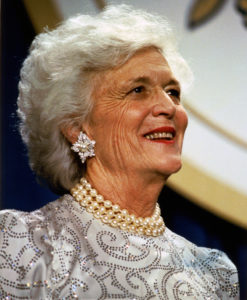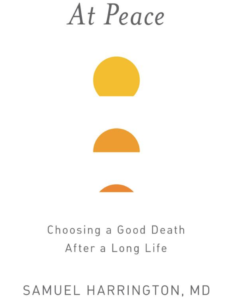As Former First Lady Barbara Bush was facing her end of life decisions, she taught us all how to die.

As Jacquielynn Floyd, with the Dallas Morning News, told us in her article today, “Advice From the First Lady: Barbara Bush Offers Us a Parting Gift,” Barbara Bush has been made those end of life decisions with her typical grace and class.
I recently read a new book called, “At Peace: Choosing A Good Death After a Long Life,” by Samuel Harrington, M.D. Dr. Harrington explains, in the book and on the video on his website, that his father had an aneurysm that would kill him if it were not treated surgically. When he talked to his father about this, his father asked, “If I don’t have it treated, how will I die?” Sam explained to him that an aneurysm like his would likely eventually burst, he would be taken to the hospital, administered pain-killing medications, and within a short period of time, he would die, to which his father answered, “Why would I want to ‘fix’ something that is going to give me my ideal death?” Dr. Harrington says his father wasn’t afraid of death – he [his father] just didn’t want to be there when it happened. He said his father’s reaction was almost like a line from a Woody Allen movie. Dr. Harrington, a prominent gastroenterologist, was well-versed in extraordinary treatment for elderly patients.
He describes how common it was for general practitioners to send elderly patients to him for colonoscopies, when the danger from the colonoscopy, in his opinion, could be as high as any underlying condition that he might discover and diagnose. He says that medicine, as we know it now, is primarily focused on diagnosing and treating illness and disease, but he suggests that maybe the better course might be, when the end is looking inevitable, how to concentrate on having a peaceful, good death. He says, if 70 is the new 50, 86 is still just the new 85. In other words, we may be able to extend life with extraordinary measures, but it may not be anything like a life that has quality, and he thinks we and those we know and love in the aging population should become educated and think about this, for everyone’s well-being.

As a lawyer who prepares Wills and Physician’s Directives (Living Wills), I have begun to recommend this book to my clients and their families as they are preparing their Wills and Physician’s Directives. While the forms that are available online are very general, Dr. Harrington suggests that we should be much more specific in what we, as the patient, want for care towards the end of our life. It is not so simple as you might think.
Many clients have answered the question for their Living Wills as simply whether or not they want life-sustaining treatment if they have an irreversible condition or a terminal condition. That may be because the cases we usually hear about are such examples as being in a permanent vegetative state and whether you would want to stay on a ventilator indefinitely. That is a good place to start, but many end-of-life decisions, in the day-to-day trenches, so to speak, are much trickier than that – you might say would be in a gray area.
Many end-of-life decisions, in the day-to-day trenches, are in a gray areas.
For example:
- When an elderly person has had repeated, chronic urinary tract infections, the next step may be catheterization and invasive treatment, but it may eventually mean that their systems are just shutting down. If that is the case, Dr. Harrington says that if antibiotics are not administered, the patient will be administered medications that will enable them to die a painless, peaceful death rather than prolonging the inevitable with painful, invasive treatment.
- If our loved one can no longer swallow, do they want to have saline solution administered by IV or do they want to be allowed to die from dehydration? Dying from dehydration sounds like such a tortured death, but Dr. Harrington states that with the proper palliative care, such as administered by hospice organizations, the dying person is completely comfortable as they pass away. Obviously, Dr. Harrington has had no one who has come back to confirm that, and I personally have relatives who have already told me, “Do NOT let me ever be thirsty,” so that makes the decisions much more complicated.
Unless we have difficult conversations, we cannot know what our loved ones would want when we are called upon to honor their wishes.
But that doesn’t mean we shouldn’t talk about it, learn our loved one’s feelings and opinions, and offer them information such as in Dr. Harrington’s book, so that the conversation can be fruitful and not based in just fear or avoidance of an uncomfortable subject. And that is exactly my point. Unless we have those difficult conversations, we cannot know what our loved ones would want at the very time we are called upon to honor their wishes. If those tough conversations never take place, then the family is left to making a decision that they may feel tortured about, and when that happens, instead of a peaceful end of life, the family may prolong their loved one’s life with measures that their loved one would not have wanted if the discussion had been had before it was too late.
Even if the loved one says, as my grandfather did to the doctor, “Well, I guess we have to do whatever it takes to keep me alive.” He was gravely ill and died in a hospital, with what Dr. Harrington calls a medicalized death, but we had peace in that we had been able to let my grandfather make that call. No one can tell you and your family what is the right choice, but I wish for you that you read this book and consider your options carefully so that when the time comes, you and your loved ones can have the life and death that they want. Not everyone is able to call the shots at the end, as it sounds like Barbara Bush was able to do at this stage, so please try to have these plans in place when the time comes. Everyone deserves a Peaceful and Good Death, especially those who have lived a long life. Thank you, Mrs. Bush, for your wisdom, grace and dignity in life and in death – you have been a mother and grandmother figure to us all.
If you need a Will, Powers of Attorney, or a Living Will, contact an attorney to assist you in making sure that these documents are in place when you need them.












